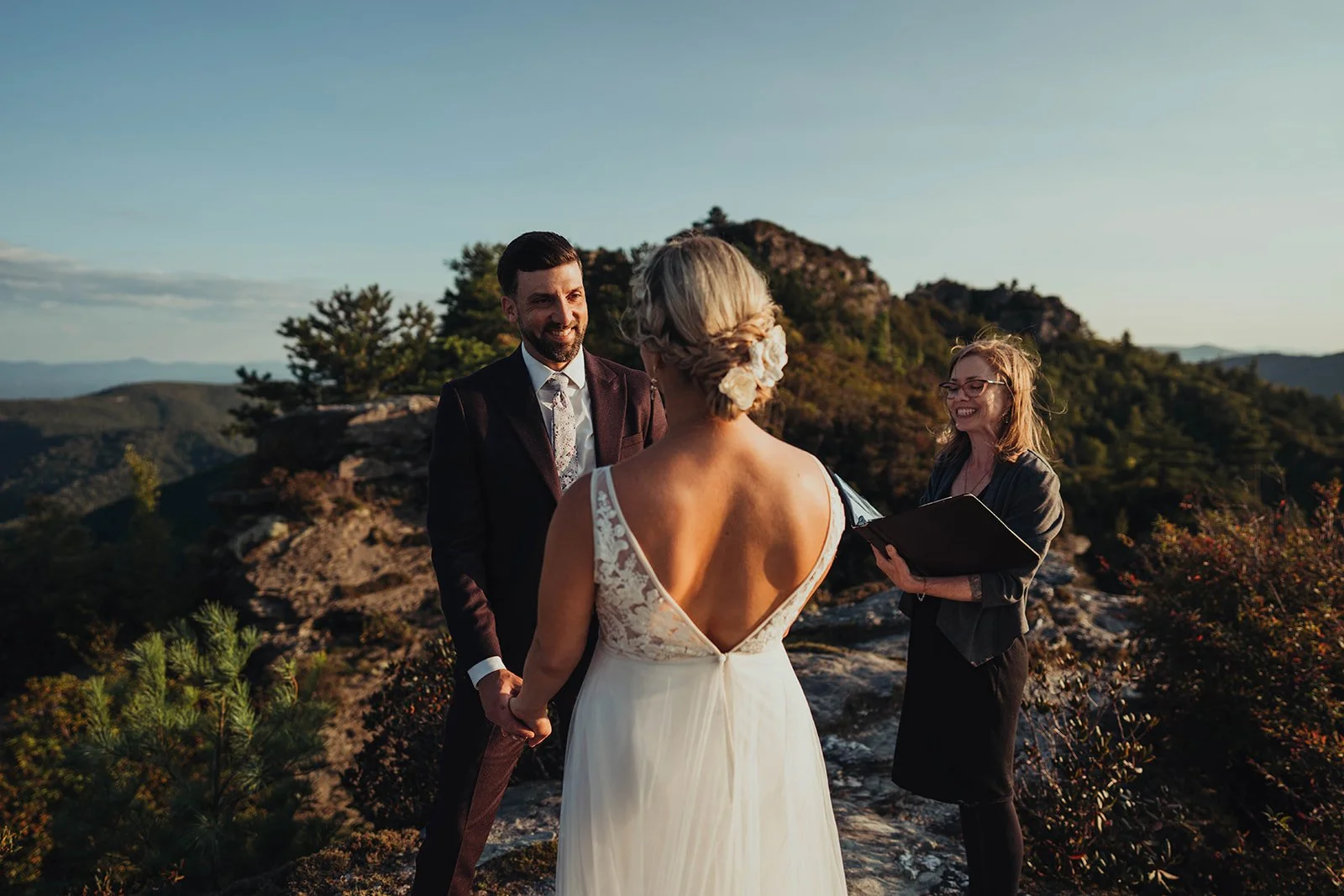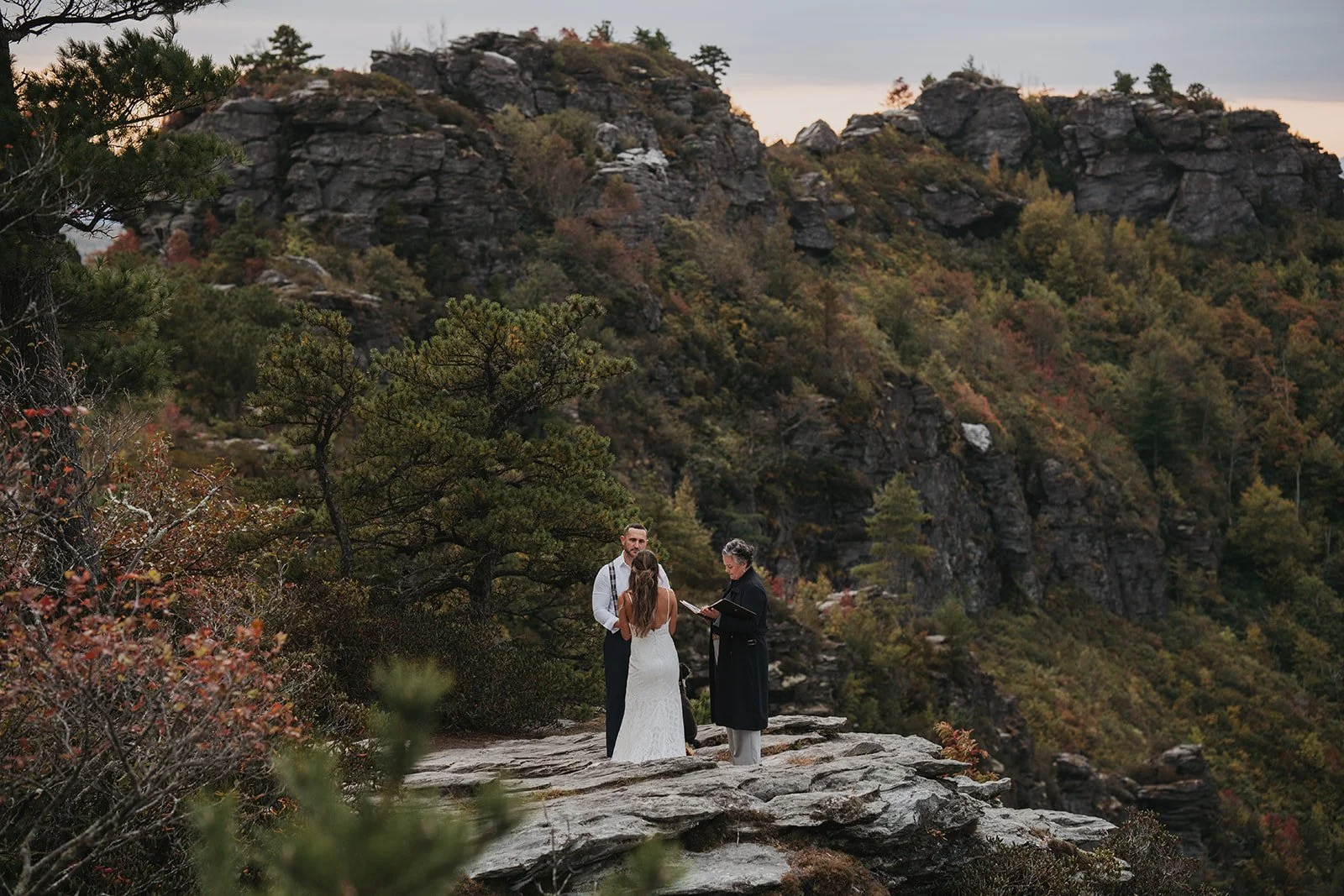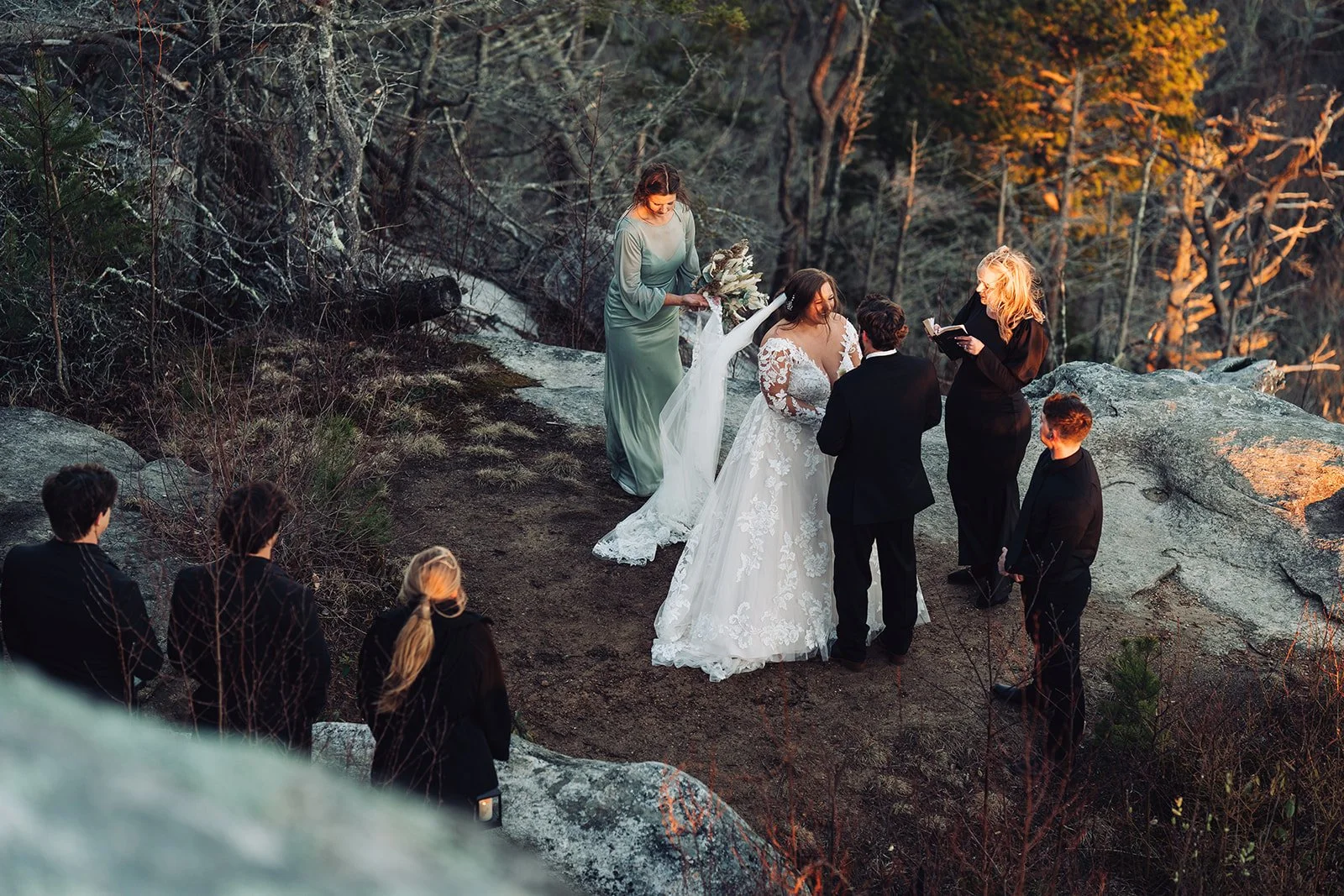How to Find an Officiant for Your Asheville Elopement
…And Why They’re Secretly the MVP
If you’re dreaming about an intimate ceremony on a rugged (and quiet) overlook or tucked into a quiet grove of red spruce, you already get it: small doesn’t mean less. It means closer. It means intentional. It means you can actually hear your vows—like, really hear them. And the person who makes that moment land? Your officiant. Think of them as the steady voice, the calm guide, the good-vibes team member who turns a pretty view into a ceremony you’ll remember in your bones.
I photograph a lot of adventure elopements and small, non-religious weddings around Asheville area and the mountains, and here’s the pattern I see over and over: a great officiant elevates everything. They don’t make it “churchy.” They make it yours—warm, inclusive, clear, and grounded in who you are.
Okay, so that’s what this post is about - the virtues of hiring a for-real officiant who can take your story and weave a ceremony from it that you’ll remember.
Note: For information on marriage licenses, check out my Asheville Elopement Guide or visit the Buncombe County Register of Deeds to answer any additional questions you may have.
What a Great Officiant Actually Does (Beyond “Saying the Words”)
On paper, an officiant leads the ceremony and signs the license. In real life, they do so much more.
They listen to your story and shape it into something you recognize.
They place you and your guests so wind isn’t stealing your vows.
They often carry gear that isn’t theirs.
They hold bouquets and umbrellas.
They help straighten boutonnieres
They help pull sticks out of wedding gowns
They also help manage or calm nerves. They make grandparents feel included. They roll with sudden gusts or a passing cloud and keep the moment steady. Their job is part writer, part guide, part public speaker, and part calm friend.
Here in Asheville, non-denominational officiants are wonderfully used to couples who are spiritual-but-not-religious, queer, interfaith, or just done with wedding scripts that feel like someone else’s. They use inclusive language as a default. They’re comfortable hiking in and know what to bring. They know when to step back so the camera (and you two) can breathe.
They also know to get out of the way for the kiss photo, too. That’s a big one!
What Working with an Officiant Feels Like
It usually starts with a quick video chat—an easy, get-to-know-you call to see if the vibe matches. One of my favorite local officiants, Gina Angel, of All the Things Ceremonies, describes her process:
Fill out her request for a virtual chat which she’ll follow up to schedule. You’ll meet and make sure it’s a good fit. If it is, she follows up with a welcome email about getting your marriage license, a questionnaire to learn your story, and some of her favorite local vendors and restaurants.
About 30 days out, she checks in again to map the ceremony flow and logistics (for elopements that step can be lighter). It’s all very human, very friendly, very “we’ve got you.”
Booking tends to be straightforward: most officiants take a 50% deposit to reserve your date, with the remaining balance due about 30 days (or a few weeks) before your wedding. Many will share a draft of your ceremony about a week before the big day so you can tweak a word or add a reading—though timing can vary based on how custom the script is. Expect a simple contract that covers travel, hiking time, whether a rehearsal is included, and who’s filing the license (hint: usually them).
Costs, Budget, and Why It’s Worth It
For Asheville/WNC and similar mountain markets, you’ll typically see officiant fees in the $500–$1200+ range. The difference between packages usually comes down to customization, duration of services, add-on services, travel/hike-in time, whether a rehearsal is included, etc.
But the real value shows up in the photos you can’t stop looking at afterward—because the ceremony landed. A professional officiant writes in your voice, keeps the pacing natural, projects clearly in a breeze, and guides everyone—without making themselves the star of the show. If you’ve ever been at a friend-officiated ceremony where the sweet intention didn’t quite translate (mumbled lines, long pauses, inside jokes that didn’t land), you’ll feel the contrast immediately.
A pro makes it heartfelt and coherent. And, they get out of the photo just before the big kiss seals it. As a photographer, that’s a big one, people! You don’t want to have to ask the couple to redo it!
Legal Bits (NC Made Simple) Without Killing the Romance
Getting married in North Carolina is refreshingly doable. You’ll apply for a marriage license at any Register of Deeds (Asheville couples often use Buncombe County). Bring your IDs; the license is valid for 60 days and can be used anywhere in the state. To make it official, you need a recognized officiant (non-denominational ministers are absolutely fine, as are magistrates) and two witnesses to sign. Your officiant almost always handles filing afterward so you can order certified copies without the paperwork headache.
Planning to say “I do” on the Blue Ridge Parkway or another public-lands overlook? Permits and guest caps can apply, and popular spots get busy. Weekdays and sunrise/sunset windows are your secret weapon—for privacy, parking, and that hush that makes vows feel even bigger.
A good officiant knows this rhythm and will help us keep the ceremony aligned with the rules.
Friend vs. Pro
I love when friends play a role—readings, welcome words, a poem, a ring-warming. But asking a friend to carry the whole ceremony outdoors is a big lift: writing, public speaking, logistics, legal filing. If your heart is set on involving someone close, consider a hybrid: hire a professional officiant to build and lead the ceremony, and invite your friend to add a moment inside that structure. You get the best of both worlds—personal and polished, meaningful and clear.
How to Choose the Right Person (Without Overthinking It)
Like most wedding vendors, I think starting with a phone call or video meeting is a good start. You’ll get a sense of their personality, energy, and whether they feel like the right match for you and your partner.
What to look for.
Do they make you feel comfortable? Do they listen to what you want? Can they exude professionalism and warmth? These are the things you’ll notice right away in conversation that you won’t pick up from a pricing page - so don’t just look at cost. You’re hiring this person to carry the ceremony and be with you on your most important day, so finding a good fit is important.
Your officiant is helping establish the tone for your ceremony. They’re the one guiding you through the moment when everything becomes real, when you stand in front of your partner and say “yes” to this next chapter. A great officiant can make your ceremony feel personal, relaxed, and connected. The wrong fit, on the other hand, can make it feel stiff, awkward, or filled with parts that may not connect well.
Lastly, make sure they’re comfortable hiking out with you to your chosen ceremony location. Most officiants are willing to hike, but double-checking that is a good idea.
Timing, Booking and Next Steps
If you’re eyeing a fall weekend in the mountains, reach out early—3–8 months is a nice window for officiants who book up fast.
For weekdays and shoulder seasons, there’s often more wiggle room. Save your date with a 50% retainer, note that your balance will be due a few weeks to ~30 days before the ceremony, and plan on reviewing your script about a week out (or sooner if your officiant prefers).
I’m happy to refer couples that book me to a short-list of inclusive, outdoors-savvy officiants I trust; these folks will guide you through everything so it feels easy. Once you’ve connected with your officiant and you’ve filled out their questionnaire and had your interview, they’re there to build you the perfect ceremony. Think: a welcome that feels like home, a minute of quiet, a unique ritual with your vows, a ring exchange, a joyful pronouncement, a kiss, and then a little celebration. With the right officiant, those 15–20 minutes become the heartbeat of the whole day.
Inclusive, Non-Religious Ideas That Still Feel “Big”
Don’t sweat it if you’re not religious, either!
You don’t need a traditional script to create a powerful, communal moment. Your officiant can help you shape personal vows that feel natural (no cringe), add a short handfasting with cords that mean something to you, include a moment of quiet to breathe together before you speak, or pass your rings privately among loved ones for a quick ring-warming. A short nature gratitude—thanking this season, this land, these people—can feel sacred without being doctrinal. The point isn’t to adopt a ritual; it’s to create 15–20 minutes that sound like you.
Want a deeper dive on ceremony moments that feel like you? I put together a friendly roundup of Asheville elopement ceremony ideas over on my blog. It covers everything from ring warming to handfasting, tree planting, grounding ceremonies, unity glass or sand, and a few more.
Read it here.
Ready to make this easy…and deeply you?
I’d love to help you pull it all together. I work with inclusive, outdoorsy officiants on nearly every mountain wedding I photograph and have a short, vetted list I’m happy to share. When you book me, I’ll share that list with you so you have some folks to reach out to right away. It’ll save you internet searching time and will get you on track to check off some of those first, big to-do’s for your elopement or wedding plans.













